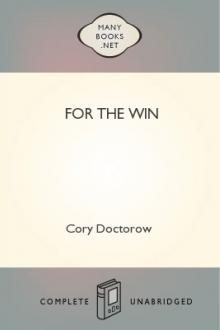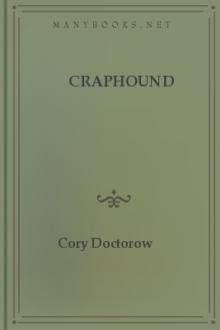For the Win - Cory Doctorow (read novels website txt) 📗

- Author: Cory Doctorow
- Performer: -
Book online «For the Win - Cory Doctorow (read novels website txt) 📗». Author Cory Doctorow
Now consider that people trade more than gold: the game Gods sell all kinds of funny money. How about this one:
Offered: Svartalfaheim Warriors bonds, worth 100,000 gold, payable six months from now. This isn't even real fake gold -- it's the promise of real fake gold at some time in the future. Stick that into the market for a couple months, baby, and watch it go. Here's a trader who'll pay five percent more than it was worth yesterday -- he's betting that the game will get more popular some time between now and six months from now, and so the value of goods in the game will go up at the same time.
Or maybe he's betting that the game Gods will just raise the price on everything and make it harder to clobber enough monsters to raise the gold to get it, driving away all but the hardest-core players, who'll pay anything to get their hands on the dough.
Or maybe he's an idiot.
Or maybe he thinks you're an idiot and you'll give him ten percent tomorrow, figuring that he knows something you don't.
And if you think that's weird, here's an even better one!
Coca-Cola sells you a six-month Svartalfaheim Warriors 100,000 gold bond, but you're worried that it's going to fall in value between now and D-Day, when the bond matures. So you find another trader and you ask him for some insurance: you offer him $1.50 to insure your bond. If the bond goes up in value, he gets to keep the $1.50 and you get to keep the profits from the bond. If the bond goes down in value, he has to pay you the difference. If that's more than $1.50, he's losing money.
This is basically an insurance policy. If you go to a life-insurance company and ask them for a policy on your life, they'll make a bet on how likely it is that you're going to croak, and charge you enough that, on average, they make a profit (providing they're guessing accurately at your chances of dying). So if the trader you're talking to thinks that Svartalfaheim Warriors is going to tank, he might charge you $10, or $100.
So far, so good, right?
Now, here's where it gets even weirder. Follow along.
Imagine that there's a third party to this transaction, some guy sitting on the sidelines, holding onto a pot of money, trying to figure out what to do with it. He watches you go to the trader and buy an insurance policy for $1.50 -- if Svartalfaheim Warriors gets better, you're out $1.50, if it gets worse, the trader has to make up the difference.
After you've sealed your deal, this third party, being something of a ghoul, goes up to the same trader and says, "Hey, how about this? I want to place the same bet you've just placed with that guy. I'll give you $1.50 and if his bond goes up, you keep it. If his bond goes down, you pay me and him the difference." Essentially, this guy is betting that your bond is junk, and so maybe he finds a taker.
Now he's got this bet, which is worth nothing if your bond goes up, and worth some unknown amount if your bond craters. And you know what he does with it?
He sells it.
He packages it up and finds some sucker who wants to buy his $1.50 bet on your bond for more than the $1.50 he'll have to cough up if your bond goes up. And the sucker buys it and then he sells it. And then another sucker buys it and he sells it. And before you know it, the 100,000 gold-piece bond you bought for $15 has $1,000 worth of bets hanging off of it.
And this is the kind of thing an arbitrageur is buying and selling. He's not carrying bananas from Mr Full to Mrs Hungry -- he's buying and selling bets on insurance policies on promises of imaginary gold.
And this is what he calls an honest day's work.
Nice work if you can get it.
This
scene is dedicated to Compass Books/Books Inc, the oldest
independent bookstore in the western USA. They've got stores up and
down California, in San Francisco, Burlingame, Mountain View and Palo
Alto, but coolest of all is that they run a killer bookstore in the
middle of Disneyland's Downtown Disney in Anaheim. I'm a stone Disney
park freak (see my first novel, Down and Out in the Magic Kingdom if
you don't believe it), and every time I've lived in California, I've
bought myself an annual Disneyland pass, and on practically every
visit, I drop by Compass Books in Downtown Disney. They stock a
brilliant selection of unauthorized (and even critical) books about
Disney, as well as a great variety of kids books and science fiction,
and the cafe next door makes a mean cappuccino.
Compass
Books/Books Inc
Matthew Fong and his employees raided through the night and into the next day, farming as much gold as they could get out of their level while the getting was good. They slept in shifts, and they co-opted anyone who made the mistake of asking what they were up to, dragooning them into mining the dungeon with them.
All the while, Master Fong was getting the gold out of their accounts as fast as it landed in them. He knew that once the game Gods got wind of his operation, they'd swoop in, suspend everyone's accounts, and seize any gold they had in their inventory. The trick was to be sure that there wasn't anything for them to seize.
So he hopped online and hit the big brokerage message-boards. These weren't just grey-market, they were blackest black, and you needed to know someone heavy to get in on them. Matthew's heavy was a guy from Sichuan, skinny and shaky, with several missing teeth. He called himself "Cobra," and he'd been the one who'd introduced Matthew to Boss Wing all those months before. Cobra worked for someone who worked for someone who worked for one of the big cartels, tough criminal organizations that had all the markets for turning game-gold into cash sewn up.
Cobra had given him a login and a briefing on how to do deals on the brokernet. Now as the night wore on, he picked his way through the interface, listing his gold and setting an asking price that was half of the selling price listed on the white, above-ground gold-store that gweilos used to buy the game gold from the brokers.
He waited, and waited, and waited, but no one bought his gold. Every game world was divided into local servers and shards, and when you signed up, you needed to set which server you wanted to play on. Once you'd picked a server, you were stuck there -- your toon couldn't just wander between the parallel universes. This made buying and selling gold all the more difficult: if a gweilo wanted to buy gold for his toon on server A, he needed to find a farmer who had mined his gold on server A. If you mined all your gold on server B, you were out of luck.
That's where the brokers came in. They bought gold from everyone, and held it in an ever-shifting network of accounts, millions of toons who fanned out all over the worlds and exchanged small amounts of gold at irregular intervals, to fool the anti-laundering snoops in the game logic that relentlessly hunted for farmers and brokers to bust.
Avoiding those filters was a science, one that had been hammered together over decades in the real world before it migrated to the games. If a big pension fund in the real world wanted to buy half a billion dollars' worth of stock in Google, the last thing they want to do is tip off everyone else that they're about to sink that much cash into Google. If they did, everyone else would snap up Google stock before they could get to it, mark it up, and gouge them on it.
So anyone who wants to buy a lot of anything -- who wants to move a lot of money around -- has to know how to do it in a way that's invisible to snoops. They have to be statistically insignificant, which means that a single big trade has to be broken up into millions of little trades that look like ordinary suckers buying and selling a little stock for the hell of it.
No matter what secrets you're trying to keep and no matter who you're trying to keep them from, the techniques are the same. In every game world there were thousands of seemingly normal characters doing seemingly normal things, giving each other seemingly normal sums of money, but at the end of the day, it all added up to millions of gold in trade, taking place right under the noses of the game Gods.
Matthew down-priced his gold, seeking the price at which a broker would deign to notice him and take it off of him. All the trading took place in slangy, rapid Chinese -- that was one of the ways the brokers kept their hold on the market, since there weren't that many Russians and Indonesians and Indians who could follow it and play along -- replete with insults and wheedles. Eventually, Matthew found the magic price. It was lower than he'd hoped for, but not by much, and now that he'd found it, he was able to move the team's gold as fast as they could accumulate it, shuttling dummy players in and out of the dungeon they were working to take the cash to bots run by the brokers.
Finally, it dried up. First, the amount of gold in the dungeon sharply decreased, with the gold dropping from 12,000 per hour to 8,000, then 2,000, then a paltry 100. The mareridtbane disappeared next, which was a pity, because he was able to sell that directly, hawking it in the big towns, pasting and pasting and pasting his offer into the chat where the real players could see it. And then in came the cops, moderators with special halos around them who dropped canned lectures into the chat, stern warnings about having violated the game's terms of service.
And then the account suspensions, the games vanishing from one screen after another, popping like soap bubbles. They were all dropped back to the login screens and they slumped, grinning crazy and exhausted, in their seats, looking at each other in exhausted relief. It was over, at last.
"How much?" Lu asked, flung backwards over his chair, not opening his eyes or lifting his head. "How much, Master Fong?"
Matthew didn't have his notebooks anymore, so he'd been keeping track on the insides of Double Happiness cigarette packages, long, neat tallies of numbers. His pen flickered from sheet to sheet, checking the math one final time, then, quietly, "$3,400."
There was a stunned silence. "How much?" Lu had his eyes open now.
Matthew made a show of checking the figures again, but that's all it was, a show. He knew that the numbers were right. "Three thousand, four hundred and two dollars and fourteen cents." It was double the biggest score they'd ever made for Boss Wing. It was the most money any of them had ever made. His share of it was more than his father made in a month. And he'd made it in one night.
"Sorry, how much?"
"8,080 bowls of dumplings, Lu. That much."
The silence was even thicker. That was a lot of dumplings. That was enough to rent





Comments (0)